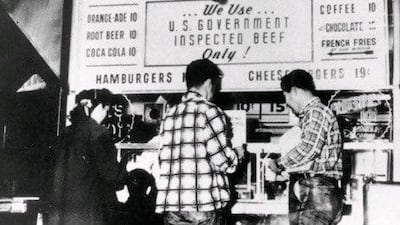What happened in San Bernadino California in the 1950s to change the way the world eats?
By understanding this story you'll get the inside scoop on successful innovation.
More Business news: Editor's pick of today's headlines
The birth of a luxury hotel is a labour-intensive process Industry Insights // The St Regis resort on Saadiyat Island is due to open in November. As the launch date approaches The National takes a look at what it takes to bring such a long-held dream to reality - with gallery. Read article
Etisalat DB faces $1.6bn fine over licences Etisalat's Indian subsidiary is facing a $1.6 billion fine for alleged foreign exchange violations, the Indian press agency reported. Read article
Bahrain rebuilds its tarnished financial image in wake of protests Rebuilding Bahrain's reputation as a place to do business could prove as challenging as the political process taking place over the coming weeks.
Every year all over the world, thousands of restaurants are opened and almost as many close their doors. Yet San Bernadino, with just over 100,000 residents, produced two restaurants that not only succeeded but went on to become household names - McDonald's and Taco Bell.
There are a lot of ideas generated every day, but few get from the drawing board to the stage and even fewer survive in the spotlight.
Why do so few ideas become great innovations? Let's look to the small town in California that changed the restaurant industry.
San Bernadino had almost everything working against it. It was relatively small compared with California's hugely populous cities of Los Angeles, San Diego and San Francisco. It was a sleepy agricultural town. And it was on the wrong side of the state. But it did have one thing going for it - Route 66.
In the 1950s, Route 66 became the main highway for vacationers from the heartland of the US heading to Los Angeles.
This sharp increase in tourism gave rise to a burgeoning trade in all manner of roadside attractions and ultimately the birth of the fast-food industry. It was the site of the first drive-through restaurant, and the emergence of franchising as a business model. And San Bernadino was perfectly situated in the right place on Route 66. Ray Kroc, a travelling salesman of the Multimixer milkshake machine from Illinois, realised Richard and Maurice McDonald were using eight of his high-tech machines in their San Bernadino burger shop. This unparalleled usage caught Kroc's interest so he travelled Route 66 to discover what was happening.
When he arrived in San Bernadino, he found a streamlined, highly efficient restaurant called McDonald's. Using their "speedee service system", the McDonald brothers had taken great care in setting up their kitchen with each worker's steps being carefully choreographed, like an assembly line, to ensure maximum efficiency.
Believing in their formula, Kroc suggested they franchise their restaurants throughout the country. When they hesitated, he volunteered to do it for them. And, as they say, the rest is history.
Across town, Glen Bell found a niche in the fledgling Mexican-style food business. He was keen on selling tacos by volume, rather than making and stuffing them individually, as was the case in full-service restaurants. So like the McDonald brothers, Bell introduced a concept that revolutionised the way the world eats.
Route 66 provided a place where ideas could be discovered; great ideas need a stage.
Much of the focus on innovation is towards idea creation. While that is undoubtedly important, innovation is a combination of idea generation, improvement and idea exposure. In the case of the McDonald brothers and Glen Bell, the car phenomenon of the 1950s and Route 66 provided the much-needed exposure to transform their ideas into huge successes.
For any organisation's innovations to work they need to take maximum advantage of their geographical location. And this brings us back here - millions of people travel through the UAE every year.
Are they bringing new ideas to us? Or is the UAE the stage to showcase homegrown ideas?
Dr Tommy Weir is author of The CEO Shift and the managing director of the Emerging Markets Leadership Centre

